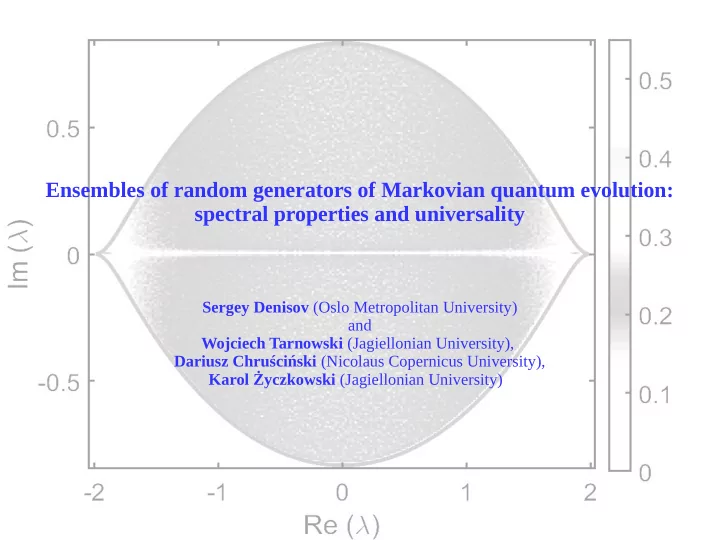

Ensembles of random generators of Markovian quantum evolution: spectral properties and universality Sergey Denisov (Oslo Metropolitan University) and Wojciech Tarnowski (Jagiellonian University), Dariusz Chruściński (Nicolaus Copernicus University), Karol Życzkowski (Jagiellonian University)
Context Gorini–Kossakowski–Sudarshan–Lindblad (GKS-L) equation f or a historical review see: D. Chruściński and S. Pascazio, Open Sys. Inf. Dyn. 24, 1740001 (2017) where Kossakowski matrix is positive, V. Gorini, A. Kossakowski, and E. C. G. Sudarshan, J. Math. Phys. 17, 821 (1976) G. Lindblad, Commun. Math. Phys. 48, 119 (1976)
Context
Context E. Kapit, P. Roushan, Ch. Neill, S. Boixo, and V. Smelyanskiy, Entanglement and complexity of interacting qubits subject to asymmetric noise , arxiv:1905.01792 ● What are states to which the system evolves under the action of ‘randomly sampled’ generators? Are they non-trivial (with respect to some quantifiers)? Are they far from some trivial ‘classical’ states, f. e., the normalized identity? ● What is the speed of relaxation to the asymptotic state? Can we have a situation when the relaxation is fast and the corresponding asymptotic state is non-trivial & essentially quantum? Dissipative Quantum Chaos: A notion of an ensemble of random operators of quantum Markovian evolution
Random GKS-L generators
Random GKS-L generators: H = 0 Recall: spectra of random CPTP maps
Random CPTP maps (or channels ) W. Bruzda, V. Cappellini, H.-J. Sommers, and K. Życzkowski (2009)
Random CPTP maps (or channels )
Random CPTP maps (or channels )
Random CPTP maps (or channels )
Random GKS-L generator
RM-model of random GKS-L generators
RM-model of random GKS-L generators
Universality of the Lemon Kossakowski matrix can be sampled in infinitely many ways [see, e.g., K. Życzkowski, K. A. Penson, I. Nechita, B. Collins, Generating random density matrices (2011)] The spectral density is independent of the sampling procedure used (if the sampling is not ‘pathological’)
Typicality of the Lemon Eigenvalues of a single realization of a purely dissipative GKS-L generator for N =100
Random GKS-L generator: general case where H is sampled from the GUE ensemble and normalized, Tr H 2 = 1/ N. The parameter weights contribution of the unitary component. Spectra of the rescaled GKS-L generators
Random GKS-L generator: general case RM-model where and C ( H ’ ) is a random GOE (GUE) matrix.
Random GKS-L generator: general case RM-model where and C ( H ’ ) is a random GOE (GUE) matrix.
Random GKS-L generator: general case RM-model where and C ( H ’ ) is a random GOE (GUE) matrix.
Random GKS-L generator: general case RM-model where and C ( H ’ ) is a random GOE (GUE) matrix.
Spectra of a random map and GKS-L generator: a comparison
Spectra of a random map and GKS-L generator: a comparison
Spectra of a random map and GKS-L generator: a comparison
Steady states of random GKS-L generators They are the steady states of random CPTP maps! I.e., normalized identities ‘coated’ by GUE “fluctuations” Spectral density of for N = 200
Steady states of random GKS-L generators They are the steady states of random CPTP maps! I.e., normalized identities ‘coated’ by GUE “fluctuations” Spectral density of for N = 200 (minus the peak at 1/200)
Steady states of random GKS-L generators They are the steady states of random CPTP maps! I.e., normalized identities ‘coated’ by GUE “fluctuations” Level spacing distribution of for N = 200
Conclusions ● Relaxation with a randomly sampled GKS-L generator is exponentially fast ● The corresponding asymptotic state is not ‘complex’ (close to a trivial state, the normalized identity) ● Is it possible to design sampling procedure which yields non-exponential relaxation (cut-off relaxation, power-law decay, etc)? ● Is it possible to design a sampling procedure which gives ‘ complex ’ states (of high purity, high entanglement, etc)? ● Is there an ensemble of random GKS-L generators with exponentially fast relaxation and non-trivial asymptotic states?
Recommend
More recommend